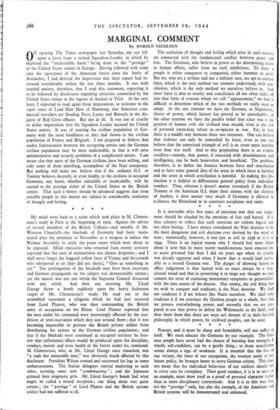My mind went back to a scene which took place
in M. Clemen- ceau's study in Paris at the beginning of 1919. Against the advice of several members of the British Cabinet—and notably of Mr. Winston Churchill—the blockade of Germany had been main- tained after the armistice of November as a weapon to induce the Weimar Assembly to ratify the peace terms which were about to be imposed. Allied emissaries who returned from enemy territory reported that the state of malnutrition was almost desperate ; and I shall never forget the haggard yellow faces of Vienna and the crowds who whispered to us (they did not shout), " Give us something to eat." The prolongation of the blockade may have been necessary and German propaganda on the subject was demonstrably untrue ; yet the matter *as not one which the Supreme Council discussed with any relish. And then one morning Mr. Lloyd George threw -a bomb suddenly upon the heavy Aubusson carpet of Mr. Clemenceau's study. - He read out to the assembled statesmen a telegram which he had just received from Lord Plumer, who was then commanding the British army of occupation on the Rhine. Lord Plumer reported that the men under his command were increasingly affected by the con- ditions of semi-starvation which they saw around them ; that it was becoming impossible to prevent the British private soldier from distributing his rations to the German civilian population ; and that if the blockade were continued in occupied territory he fore- saw that unfortunate effects would be produced upon the discipline, conduct, morale and even health of the forces under his command. M. Clemenceau, who, as Mr. Lloyd George once remarked, was "a rude but reasonable man," was obviously much affected by this disclosure. President Wilson crossed and uncrossed his legs in some embarrassment. The Italian delegates started muttering to each other, scenting some new "consbinazione" ; and the Japanese grinned their enigmatic grin. Mr. Lloyd George's bomb had what might be called a mixed reception ; one thing alone was quite certain ; the " prestige " of Lind Plumer and the British private soldier had not suffered at all.


























 Previous page
Previous page